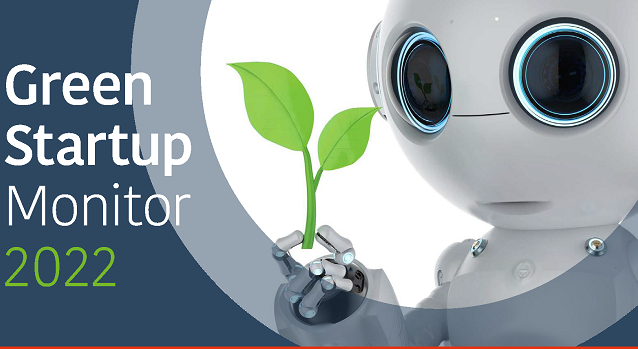4th Green Startup Monitor published
With their great innovative capacity, green startups are driving the transformation of the German economy. This is shown by the 4th Green Startup Monitor, compiled by the Startup Association and the Borderstep Institute for Innovation and Sustainability.
Young innovative companies in Germany have a clear focus on the issue of sustainability: The support of innovations to tackle climate change (38%) forms the most important demand of German startups to politicians after the reduction of bureaucracy (40%). Thus, they are the driver of the sustainable transformation of our economy. This becomes clear in the energy sector: More than two-thirds of all startups in the energy sector can be classified as green because they accelerate Germany’s steps toward climate neutrality with their environmentally friendly products and services.
Women founding “green”
Green startups have become a central part of the German startup ecosystem; almost one in three German startups is green, according to the findings of the Green Startup Monitor. In addition, green startups are also doing pioneering work in terms of diversity. At 21 percent, the proportion of female founders is significantly higher than in the startup ecosystem as a whole.
At the same time, green startups want to have the greatest possible impact with entrepreneurial means and are transformation-oriented: 35% of these startups combine their sustainable orientation with an orientation toward rapid growth in order to change value chains and markets. In doing so, they meet the challenge of a sustainable transformation of the German economy with radically new entrepreneurial approaches to solutions, whereby they are more innovative and technology-oriented than conventional startups. German universities are an important starting point for green innovations. Almost one third of all green startups are research-related startups.
Little push in the construction and financial sectors
Green innovations are essential for achieving the climate targets. Green startups are spread across almost all sectors of the German economy. In addition to the energy industry, the proportion of green startups in agriculture is particularly high (66 percent). Other climate-relevant sectors such as construction and real estate (25 percent) or tourism (18 percent) urgently need to catch up. The same applies to financial service providers. Startups in the banking, finance and insurance sectors are not providing sufficient impetus for the realization of the Sustainable Finance Strategy of the EU and the German government.
Universities as hotspots
The dense network of outstanding university research in Germany is the origin of numerous innovative green companies. Almost one third of all green startups are research-related startups. Green founders often get to know each other at university (40%). Among green startups, the share of founders with a degree in engineering is significantly higher (29 percent) than among non-green startups (20 percent). While three out of four startups have taken advantage of consulting services and financial support such as EXIST funding, there is still considerable need for development in terms of sustainability-related offerings. Sustainability-related consulting and support services for startups have so far been scarce at German universities.
Prof. Dr. Klaus Fichter, Co-author GSM22, Founder and Director of the Borderstep Institute for Innovation and Sustainability, Carl von Ossietzky University Oldenburg, Adjunct Professorship for Innovation Management and Sustainability (PIN):
“The Green Startup Monitor 2022 shows the high importance of universities and research institutions for innovative green startups. One serious deficit, however, is that universities have so far provided hardly any sustainability-related services as part of their startup support. Here, university managers and funding policy are equally in demand. The study Sustainability in University Start-up Support shows practical examples and starting points.”
Prof. Dr. Yasmin Olteanu, Co-Author GSM22, Borderstep Research Fellow, Berlin University of Applied Sciences, Professor of Business Administration/Entrepreneurship.:
“Every third green startup is transformational, i.e. a high potential for the big transformation towards a sustainable society and economy. These green startups think much bigger, are more innovative and technology-oriented – and thus actually highly attractive to funders. Nevertheless, a lack of capital is currently holding them back – especially in the area of venture capital. Our demand: a targeted improvement in the financing conditions for transformation-oriented startups in Germany.”
David Hanf, Vice Chairman Startup Association: “The Green Startup Monitor 2022 clearly shows that startups with a positive ecological impact have established themselves in Germany at a high level. This is good news in the context of the necessary transformation towards a climate-neutral economic system, because what matters now is speed and consistent implementation. To this end, startups need target-group-oriented support, especially for growth companies that have the potential to sustainably change markets in the sense of a generation-appropriate future.”
Green Startup Monitor
The Green Startup Monitor analyzes the importance of those startups that contribute to the ecological goals of a Green Economy with their products and services. It was published for the fourth time by the Borderstep Institute and the German Startups Association in 2022. The study is based on data collected through an online questionnaire from 1,707 innovative and growth-oriented companies that are less than 10 years old and have their headquarters in Germany. The Green Startup Monitor can be downloaded free of charge.
Study Sustainability in University Start-up Support
The brochure offers universities and especially university start-up consulting an insight into the spectrum of support services.
Borderstep Institute for Innovation and Sustainability gGmbH
As an independent and non-profit scientific institution, Borderstep researches the future and examines what is coming (innovation) and what is staying (sustainability). The focus is on developing solutions to problems and action strategies for sustainable economic activity.
Startup Association
The Startup-Verband is the representative and voice of startups in Germany. It explains and represents the interests, viewpoints and concerns of startup companies to legislation, administration and the public. It promotes innovative entrepreneurship and carries the startup mentality into society. The association sees itself as a network of startups in Germany.

